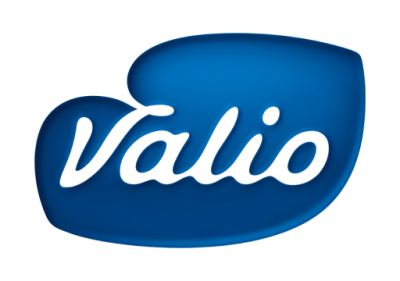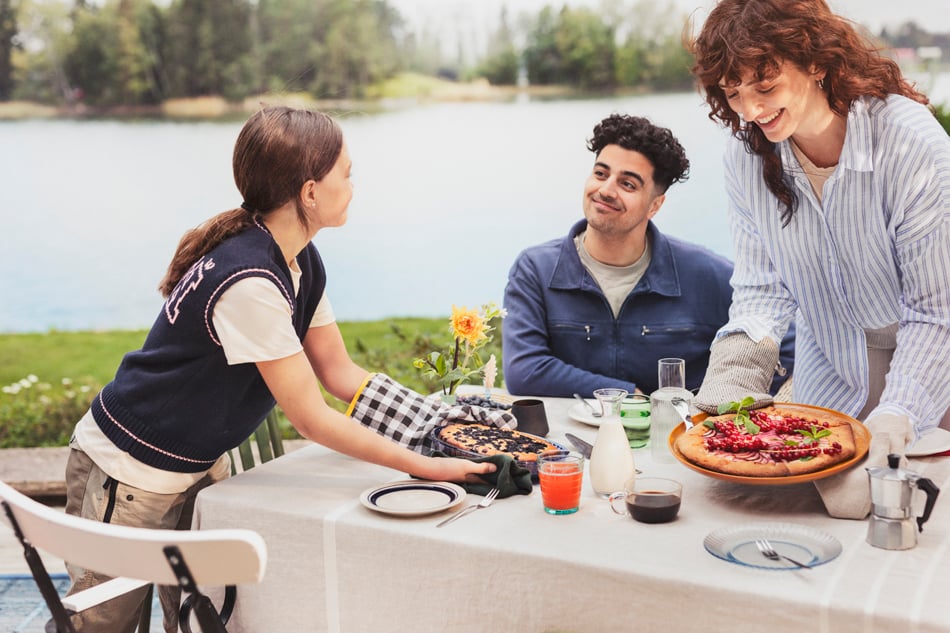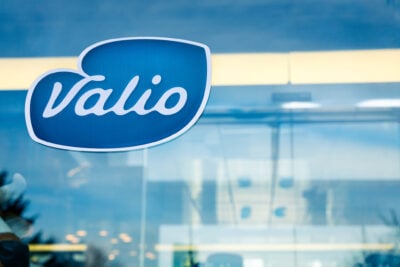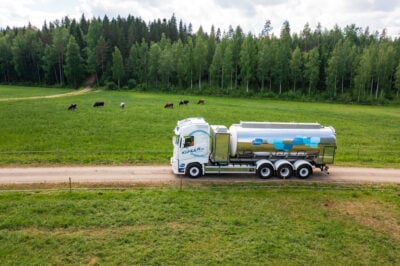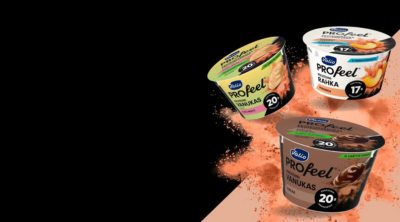The operating environment in 2023 was once again challenging for Valio and the entire food industry. The war in Ukraine and general economic uncertainty continued. Weakening consumer purchasing power and the drastic decline in the global market prices of industrial dairy products together with cost inflation, reflected on Valio’s result. Farms also continued to face a tight economic situation: costs were around 30 per cent higher at the end of 2023 compared to the beginning of 2021, although the rise in costs did ease during the year. In the challenging operating environment, Valio continued implementing its strategy with determination. Valio Group net sales stood at EUR 2 278 million, up about 2 per cent on 2022 (EUR 2 236 million).
The growth in net sales stemmed largely from the price rises implemented in 2022. Weakening consumer purchasing power and the drastic decline in the global market prices of butter and milk powder together with cost inflation resulted in a fall in the milk return, which is used to measure Valio’s profitability. Domestic net sales increased by 6.8 per cent, and international net sales decreased by 6.5 per cent.
Situation at dairy farms remains difficult
Valio is owned by some 3 400 dairy farms through cooperatives. Valio’s primary purpose is to pay the best possible return to its owners, i.e. the dairy farms, through the cooperatives. Dairy farmer entrepreneurs continued to face challenges in 2023. High interest rates, high fertiliser prices, and uncertainty regarding energy prices continued to challenge farms, although the rise in costs did ease during 2023. The crisis for producers is not yet over.
Valio’s financial success is measured with a milk margin* and a milk return**. The milk margin amounted to EUR 983 million (EUR 1 008 million), and the milk return was 51.6 cents per litre (52.5 c/l), i.e. slightly lower than the previous year. Although the average price paid for raw milk by Valio to dairy cooperatives in 2023 was higher (53.7 c/l) than the 2022 average (52.1 c/l), the price level was considerably lower at the end of the year compared to the beginning.
“Despite the challenging markets and operating environment, we advanced our strategy in determined fashion. In our domestic market, comprising Finland, Sweden, and Estonia, we succeeded in defending our market position in the face of weakening consumer purchasing power. We also continued the determined development of our business aimed at professional kitchens and the industrial product business,” notes Valio CEO Annikka Hurme.
Interesting new dairy and plant-based products strengthened Valio’s market position
Valio’s vision is to be the leading dairy and food company with loved brands and innovative solutions. Our strength lies in dairy business operations in Finland, Sweden, and the Baltic States, and we will continue to further their development. At the same time, we are investing in plant-based brands and products, and we are introducing new products to store shelves.
In Finland, Valio increased its market share in categories such as snack products, cottage cheeses, and cheeses. Several new items were added to the popular Valio PROfeel® snack product family and to the range of Valio baking products and grated cheeses. The plant-based products category grew in autumn with the launch of the renewed Gold&Green® brand as well as new, plant-based Gold&Green® products. Gold&Green® took over as market leader in Finland during the autumn, and towards the end of the year the total market for plant-based products began to grow again.
Valio exports account for about a quarter of Finland’s food exports
Net sales from Valio’s international operations totalled EUR 778 million (EUR 832 million). Product exports from Finland to some 50 countries totalled about EUR 507 million. In export markets, Valio’s profitability was challenged by the fall in global market prices of industrial products, and the poor global economic conditions, which was reflected in the demand for value-added ingredients and solutions for international industrial customers. In line with its strategy, Valio continued investments in value-added ingredients.
The fall in prices of international industrial products, i.e. industrial butter and milk powders, ended during 2023. The demand for industrial butter was strong towards the end of the year as the price levels rose, yet remained clearly below the level of 2022.
In China, Valio continued to invest in sales of value-added milk powders and in growing the market. The general deceleration of the rising rate of inflation and the falling food prices after their rapid increase in 2022 lowered the prices of basic and organic milk powders, and the value of sales decreased on the previous year, even though profitability improved.
Profitability increased considerably in the United States. In Sweden, net sales increased on the previous year, mainly due to price rises. Sales of Oddlygood®, PROfeel®, and Gårdsgoda products developed positively. In the Baltic States, Valio successfully defended its position as market leader, despite high inflation and consumers’ weaker purchasing power.
Owned by Valio and Mandatum Asset Management, Oddlygood expanded into new markets, and established subsidiaries in Great Britain and the Netherlands. In October, the company acquired the Nordic brand Planti. Through the acquisition, Oddlygood became the market leader in plant-based spoonable snacks in Sweden and in plant-based cooking products in Finland.
Manure-based gas business progressed
The business development of Suomen Lantakaasu Oy, Valio and energy company St1’s joint venture, progressed as planned. The environmental impact assessment for the biogas plant in the Upper Savo region was completed and an environmental permit application was submitted in November. The project in Upper Savo will develop the main plant in Kiuruvesi, as well as three satellite plants in neighbouring municipalities.
Suomen Lantakaasu started to map new plant locations in the Ostrobothnia region and signed a share purchase agreement on a majority shareholding of Nurmon Bioenergia Oy’s unfinished biogas plant project. The biogas plant being constructed in Nurmo will produce domestic renewable energy and various types of biofertilisers from manure and agricultural byproducts from local farms. Together, these projects will enable production of up to a half of Suomen Lantakaasu Oy’s target of 1 TWh.
Climate programme advanced
Valio’s greenhouse gas emissions from operations in Finland in 2023 were about 2.16 million carbon dioxide equivalent tonnes (Mt CO₂e). Of the total emissions, the raw milk received accounted for 80 per cent, energy use at production plants 7 per cent, and logistics 2 per cent. Total emissions from Valio’s Finnish operations in 2023 decreased by about 8 per cent compared to 2022. Emissions (scope 1) from heat production and refrigerant use at our production plants decreased by 11 per cent. The emissions reductions are driven by the increasing transition to renewable heat sources as well as energy-efficiency actions and investments. Valio’s climate programme is aiming for a net-zero milk value chain by 2035.
We monitor dairy farm greenhouse gas emissions using the Valio Carbo® Farm Calculator. Close to 2 500 farms calculated the carbon footprint of their own production, which accounts for around 80 per cent of Valio’s total milk procurement. The model used as the basis for the Valio Carbo® Farm Calculator was developed further together with the Natural Resources Institute Finland and Atria Plc. The Valio Carbo® Farm Calculator will become the national standard in carbon footprint calculation for cattle farming in Finland.
Valio continued extensively training dairy farmers in carbon farming in 2023. The training has now been provided at around 1 500 farms, and carbon farming is practised on nearly 130 000 hectares of farmed land.
In 2022 and 2023, Valio successfully piloted the use of a feed additive to reduce the methane emissions of cows at Valio dairy farms. The pilot process implemented in 2023 involved 40 dairy farms and more than 3 000 cows. The feed additive worked well in practice, encountering no problems in production, milk quality or animal health. The goal for 2024–2025 is to expand the use of the additive. At the same time, the aim is to create an opportunity for export customers to participate in reducing methane emissions together with Valio.
Valio renewed the dairy farm sustainability programme in May 2023. In addition to measures related to animal well-being, dairy farms may now receive a higher price for their milk based on grazing and opportunities for cows to stay outdoors, farming that supports biodiversity, and work to reduce the carbon footprint of the farm. The reform is significant for agriculture overall, as around 80 per cent of the milk produced in Finland is covered by Valio’s sustainability programme.
Year 2024
“Although the operating environment is currently challenging with respect to business operations, food is a global growth business in the long term. Dairy product consumption is growing in emerging markets such as Asia, and plant-based product consumption in the western world,” says Annikka Hurme.
Year 2024 is continuing to progress along the guidelines of Valio’s strategy. Through strategic projects, Valio seeks to generate new growth, improve operational efficiency, and enhance profitability in the coming years.
“We purposefully continue, for example, to develop our expertise in the R&D, sales, and production of value-added powders. Our Valio Aimo® wholesale unit aims to be a trailblazer in the Food Service market in Finland. Suomen Lantakaasu Oy, a joint venture with energy company St1 Oy, is continuing operations in 2024 according to its business plan. It is intended that the final investment decision on the hybrid facility in the Northern Savo region will be made in autumn 2024, and that the plant will be in operation by 2026,” says Hurme.
Additionally, the programme to improve Valio’s financial results, launched in 2022 and continuing to 2025, aims to boost efficiency, increase profitability and avoid cost increases. Hundreds of different measures to improve results are being implemented, including reducing costs, seeking cost-effective ways of working, and improving daily operating processes.
One of early 2024’s significant events is the launch of Food 2.0, an extensive research, development and innovation project. The goal of the five-year project is to create in Finland an environmentally sound food system in which growth, profitability, and added value are built on the foundation of sustainable production.
In February 2024, Valio’s Food 2.0 project was granted funding of EUR 10 million by Business Finland’s challenge competition. In addition, Business Finland is prepared to provide funding of EUR 20 million to RDI projects run in Valio’s partner network within the Food 2.0 concept. The food system is linked to hundreds of companies and other actors in Finland, and the aim is to have at least one hundred partners in the network. Valio and the partner network’s goal is to generate additional investments of EUR 100 million in research and development activities in Finland over a period of five years, and to grow exports linked to the food system by more than one billion euros in the years after the project.
In January, Valio commenced change negotiations concerning 1 170 people. The factors underlying the negotiations were the fall in global market prices and consumer demand, as well as the need for adaptation due to increasing costs. The personnel reductions affected 89 people, and the planned substantial changes to terms and conditions of employment 114 people. The goal of the negotiations was to improve Valio’s profitability and secure its ability to pay dairy cooperatives for their raw milk.
There have been several political strikes in Finland in early 2024. While some Valio units were on strike for a few days, production and deliveries were largely completed as per normal. In March-April, sea container transports were halted completely for about a month, so deliveries to international customers were delayed significantly. Most of the deliveries to the EU area could be completed, although they have entailed challenges, too. Interruptions to deliveries also involve significant challenges and costs in terms of warehousing. During the spring months, it is highly likely that Finnish ports will be congested, container availability poor, and cargo ship capacity fully booked, which will in turn result in further delays. The final costs and effect on business operations cannot be assessed until later in the spring.
Read more: Valio’s Sustainability Report and Board of Directors’ Report and Financial Statements 2023
Valio Group’s key figures in 2023
| 2023 | 2022 | Change | |
| Net sales, MEUR | 2 278 | 2 236 | 1.9 % |
| Milk margin, MEUR | 983 | 1 008 | -2.5 % |
| Milk return, c/l | 51.6 | 52.5 | -1.7 % |
| Milk volume, ML | 1 664 | 1 682 | -1.1 % |
| Equity assets ratio | 53 % | 50 % | +3 % points |
| Investments, MEUR | 79 | 55 | 43.3 % |
*Milk margin, MEUR =
Net sales less all other costs excluding the price paid to the co-operatives for raw milk, interest on shareholder loans, depreciation according to plan, supplementary payments to the pension fund, pension contribution refunds, and items not included in actual business operations, such as sales gains from sales of business operations, provisions, sales gains and losses from real estate sales, write-offs of non-current assets, costs arising from acquisitions of companies and business operations, and subsidiaries’ minority interest of the profit. The milk margin includes Valio Ltd’s taxes, with the tax share of the net profit corresponding to the amount of the average dividend percentage from the share capital, and taxes of subsidiaries. Taxes also include the cost effect of direct taxes resulting from depreciation deficit.
**Milk return, c/l =
Milk margin less estimated required financing for investments, and the figure is divided by the milk volume taken in from the owners of Valio Ltd.
